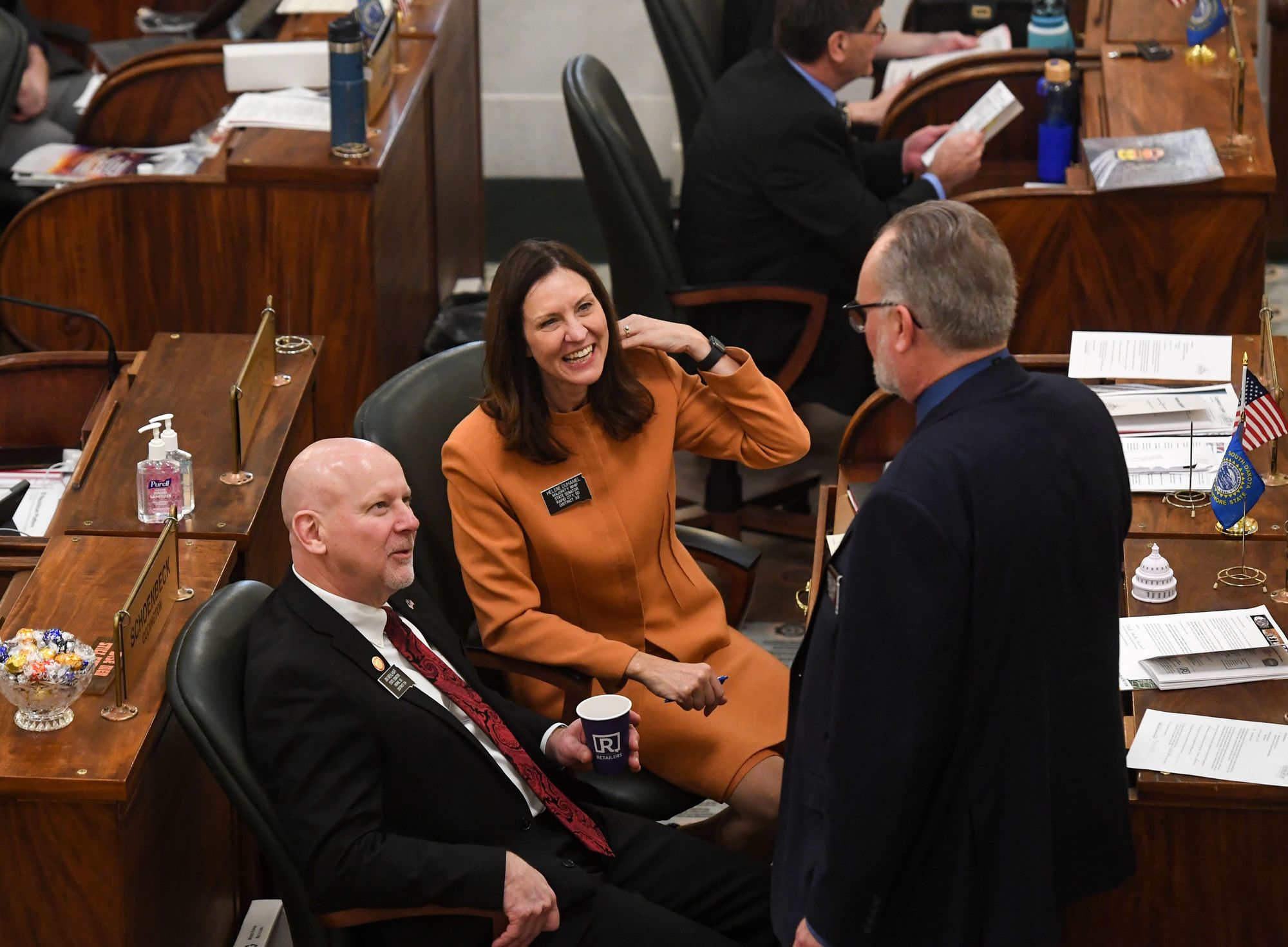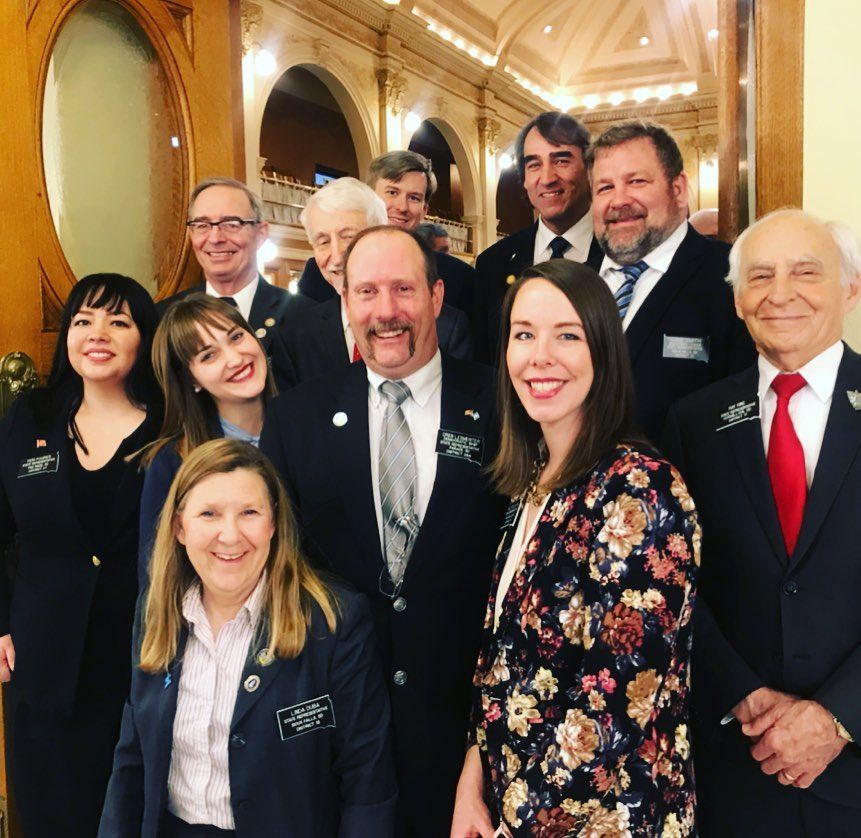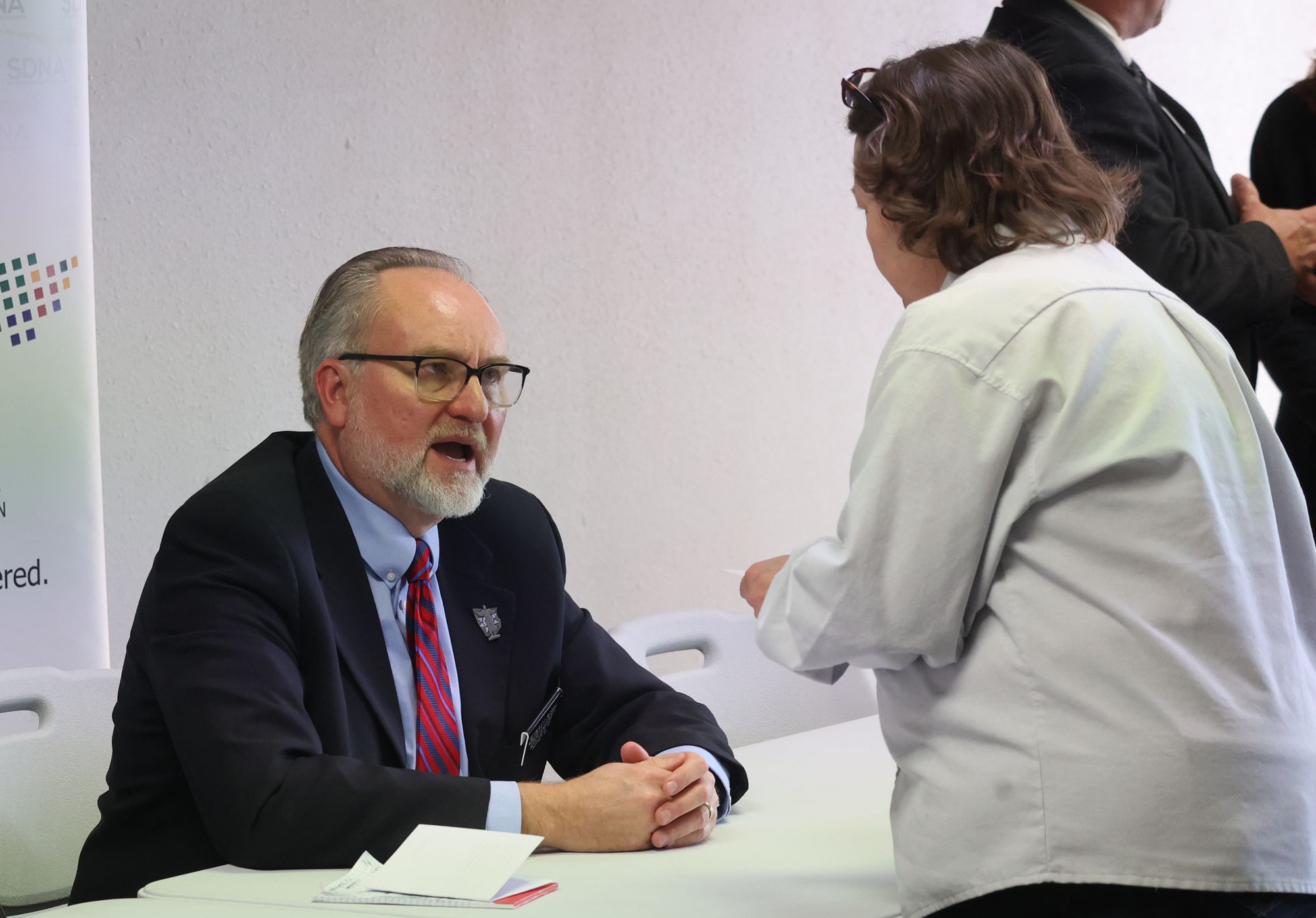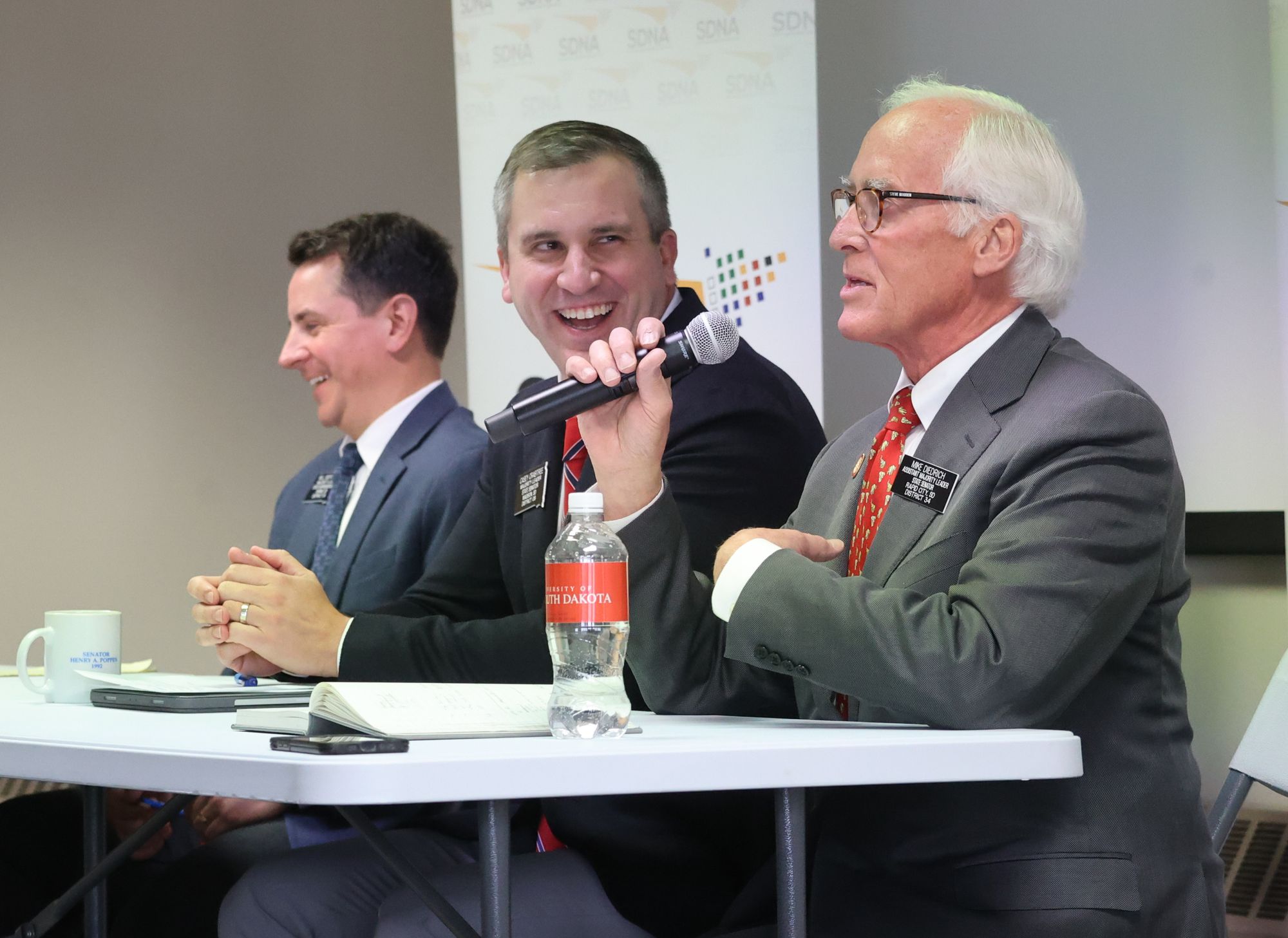As it winds to a close, the 2023 legislative session in South Dakota will likely be remembered as the year of the great tax cut debate and for the somewhat surprising willingness of the GOP-led Legislature to reject several proposals from a popular Republican governor.
But many observers and participants in the process are noting another significant milestone this year: a noticeable return to civility, decorum and cordiality in the state Capitol.
Tim Rave is a health care lobbyist who served 13 years in the South Dakota Legislature in the early 2000s, including as speaker of the House and Senate majority leader.
Rave said the legislative process in 2023 so far has been “very enjoyable and smooth” due to the new spirit of civility and cordiality, even during heated policy debates.
“It is markedly different than it has been the past four or five years,” Rave said. “You’ve seen the House and Senate come together, and even when they don’t come together on issues, there’s just a more cordial, respectful debate among the chambers.”
The results of the improved civility are hard to pin down, but observers and lawmakers say policy debates are more respectful and reasoned, that the process is running on time, that there’s a greater sense of bipartisanship, and that the bills ultimately sent to Gov. Kristi Noem for signing are better vetted and stronger in intent and outcome.

As it winds to a close, the 2023 legislative session in South Dakota will likely be remembered as the year of the great tax cut debate and for the somewhat surprising willingness of the GOP-led Legislature to reject several proposals from a popular Republican governor.
But many observers and participants in the process are noting another significant milestone this year: a noticeable return to civility, decorum and cordiality in the state Capitol.
Tim Rave is a health care lobbyist who served 13 years in the South Dakota Legislature in the early 2000s, including as speaker of the House and Senate majority leader.
Rave said the legislative process in 2023 so far has been “very enjoyable and smooth” due to the new spirit of civility and cordiality, even during heated policy debates.
“It is markedly different than it has been the past four or five years,” Rave said. “You’ve seen the House and Senate come together, and even when they don’t come together on issues, there’s just a more cordial, respectful debate among the chambers.”
The results of the improved civility are hard to pin down, but observers and lawmakers say policy debates are more respectful and reasoned, that the process is running on time, that there’s a greater sense of bipartisanship, and that the bills ultimately sent to Gov. Kristi Noem for signing are better vetted and stronger in intent and outcome.
As it winds to a close, the 2023 legislative session in South Dakota will likely be remembered as the year of the great tax cut debate and for the somewhat surprising willingness of the GOP-led Legislature to reject several proposals from a popular Republican governor.
But many observers and participants in the process are noting another significant milestone this year: a noticeable return to civility, decorum and cordiality in the state Capitol.
Tim Rave is a health care lobbyist who served 13 years in the South Dakota Legislature in the early 2000s, including as speaker of the House and Senate majority leader.
Rave said the legislative process in 2023 so far has been “very enjoyable and smooth” due to the new spirit of civility and cordiality, even during heated policy debates.
“It is markedly different than it has been the past four or five years,” Rave said. “You’ve seen the House and Senate come together, and even when they don’t come together on issues, there’s just a more cordial, respectful debate among the chambers.”
The results of the improved civility are hard to pin down, but observers and lawmakers say policy debates are more respectful and reasoned, that the process is running on time, that there’s a greater sense of bipartisanship, and that the bills ultimately sent to Gov. Kristi Noem for signing are better vetted and stronger in intent and outcome.
“I care a lot about the history of the place and the traditions. They take decades to build and only a few years to destroy, and I came to keep the good ones going if I can.” Rep. Will Mortenson, House majority leader
As it winds to a close, the 2023 legislative session in South Dakota will likely be remembered as the year of the great tax cut debate and for the somewhat surprising willingness of the GOP-led Legislature to reject several proposals from a popular Republican governor.
But many observers and participants in the process are noting another significant milestone this year: a noticeable return to civility, decorum and cordiality in the state Capitol.
Tim Rave is a health care lobbyist who served 13 years in the South Dakota Legislature in the early 2000s, including as speaker of the House and Senate majority leader.
Rave said the legislative process in 2023 so far has been “very enjoyable and smooth” due to the new spirit of civility and cordiality, even during heated policy debates.
“It is markedly different than it has been the past four or five years,” Rave said. “You’ve seen the House and Senate come together, and even when they don’t come together on issues, there’s just a more cordial, respectful debate among the chambers.”
The results of the improved civility are hard to pin down, but observers and lawmakers say policy debates are more respectful and reasoned, that the process is running on time, that there’s a greater sense of bipartisanship, and that the bills ultimately sent to Gov. Kristi Noem for signing are better vetted and stronger in intent and outcome.
As it winds to a close, the 2023 legislative session in South Dakota will likely be remembered as the year of the great tax cut debate and for the somewhat surprising willingness of the GOP-led Legislature to reject several proposals from a popular Republican governor.
But many observers and participants in the process are noting another significant milestone this year: a noticeable return to civility, decorum and cordiality in the state Capitol.
Tim Rave is a health care lobbyist who served 13 years in the South Dakota Legislature in the early 2000s, including as speaker of the House and Senate majority leader.
Rave said the legislative process in 2023 so far has been “very enjoyable and smooth” due to the new spirit of civility and cordiality, even during heated policy debates.
“It is markedly different than it has been the past four or five years,” Rave said. “You’ve seen the House and Senate come together, and even when they don’t come together on issues, there’s just a more cordial, respectful debate among the chambers.”
The results of the improved civility are hard to pin down, but observers and lawmakers say policy debates are more respectful and reasoned, that the process is running on time, that there’s a greater sense of bipartisanship, and that the bills ultimately sent to Gov. Kristi Noem for signing are better vetted and stronger in intent and outcome.

As it winds to a close, the 2023 legislative session in South Dakota will likely be remembered as the year of the great tax cut debate and for the somewhat surprising willingness of the GOP-led Legislature to reject several proposals from a popular Republican governor.
But many observers and participants in the process are noting another significant milestone this year: a noticeable return to civility, decorum and cordiality in the state Capitol.
Tim Rave is a health care lobbyist who served 13 years in the South Dakota Legislature in the early 2000s, including as speaker of the House and Senate majority leader.
Rave said the legislative process in 2023 so far has been “very enjoyable and smooth” due to the new spirit of civility and cordiality, even during heated policy debates.
“It is markedly different than it has been the past four or five years,” Rave said. “You’ve seen the House and Senate come together, and even when they don’t come together on issues, there’s just a more cordial, respectful debate among the chambers.”
The results of the improved civility are hard to pin down, but observers and lawmakers say policy debates are more respectful and reasoned, that the process is running on time, that there’s a greater sense of bipartisanship, and that the bills ultimately sent to Gov. Kristi Noem for signing are better vetted and stronger in intent and outcome.

As it winds to a close, the 2023 legislative session in South Dakota will likely be remembered as the year of the great tax cut debate and for the somewhat surprising willingness of the GOP-led Legislature to reject several proposals from a popular Republican governor.
But many observers and participants in the process are noting another significant milestone this year: a noticeable return to civility, decorum and cordiality in the state Capitol.
Tim Rave is a health care lobbyist who served 13 years in the South Dakota Legislature in the early 2000s, including as speaker of the House and Senate majority leader.
Rave said the legislative process in 2023 so far has been “very enjoyable and smooth” due to the new spirit of civility and cordiality, even during heated policy debates.
“It is markedly different than it has been the past four or five years,” Rave said. “You’ve seen the House and Senate come together, and even when they don’t come together on issues, there’s just a more cordial, respectful debate among the chambers.”
The results of the improved civility are hard to pin down, but observers and lawmakers say policy debates are more respectful and reasoned, that the process is running on time, that there’s a greater sense of bipartisanship, and that the bills ultimately sent to Gov. Kristi Noem for signing are better vetted and stronger in intent and outcome.

As it winds to a close, the 2023 legislative session in South Dakota will likely be remembered as the year of the great tax cut debate and for the somewhat surprising willingness of the GOP-led Legislature to reject several proposals from a popular Republican governor.
But many observers and participants in the process are noting another significant milestone this year: a noticeable return to civility, decorum and cordiality in the state Capitol.
Tim Rave is a health care lobbyist who served 13 years in the South Dakota Legislature in the early 2000s, including as speaker of the House and Senate majority leader.
Rave said the legislative process in 2023 so far has been “very enjoyable and smooth” due to the new spirit of civility and cordiality, even during heated policy debates.
“It is markedly different than it has been the past four or five years,” Rave said. “You’ve seen the House and Senate come together, and even when they don’t come together on issues, there’s just a more cordial, respectful debate among the chambers.”
The results of the improved civility are hard to pin down, but observers and lawmakers say policy debates are more respectful and reasoned, that the process is running on time, that there’s a greater sense of bipartisanship, and that the bills ultimately sent to Gov. Kristi Noem for signing are better vetted and stronger in intent and outcome.
As it winds to a close, the 2023 legislative session in South Dakota will likely be remembered as the year of the great tax cut debate and for the somewhat surprising willingness of the GOP-led Legislature to reject several proposals from a popular Republican governor.
But many observers and participants in the process are noting another significant milestone this year: a noticeable return to civility, decorum and cordiality in the state Capitol.
Tim Rave is a health care lobbyist who served 13 years in the South Dakota Legislature in the early 2000s, including as speaker of the House and Senate majority leader.
Rave said the legislative process in 2023 so far has been “very enjoyable and smooth” due to the new spirit of civility and cordiality, even during heated policy debates.
“It is markedly different than it has been the past four or five years,” Rave said. “You’ve seen the House and Senate come together, and even when they don’t come together on issues, there’s just a more cordial, respectful debate among the chambers.”
The results of the improved civility are hard to pin down, but observers and lawmakers say policy debates are more respectful and reasoned, that the process is running on time, that there’s a greater sense of bipartisanship, and that the bills ultimately sent to Gov. Kristi Noem for signing are better vetted and stronger in intent and outcome.




